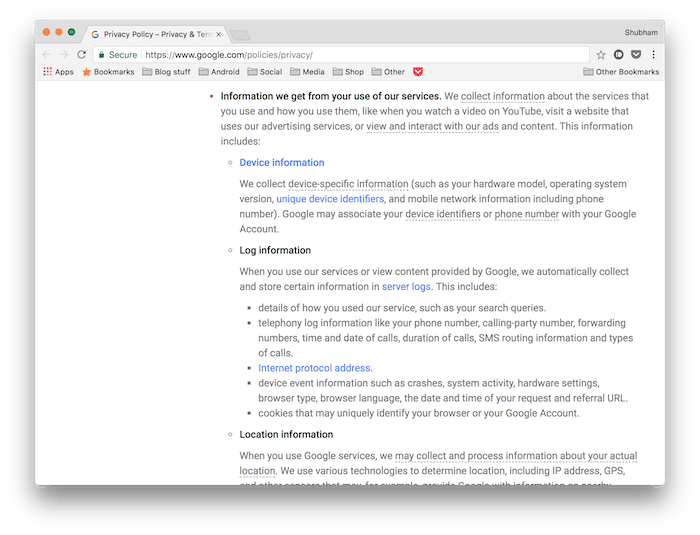However, before jumping to conclusions here, you should know that OnePlus is not the only manufacturer that does this. In fact, nearly every Android phone collects such information and shares it with the respective company for various purposes. Google itself has been known to record most of the device-specific identifier there is. Of course, apart from this, the search engine juggernaut stores every bit of browsing detail you provide them for advertising and recommendations. According to their Privacy Policy, Google collects “device-specific information (such as your hardware model, operating system version, unique device identifiers, and mobile network information including phone number.”
In addition to that, the document mentions, “Certain services include a unique application number. This number and information about your installation (for example, the operating system type and application version number) may be sent to Google when you install or uninstall that service or when that service periodically contacts our servers, such as for automatic updates.” Similarly, Samsung’s Privacy Policy states, “we may collect device information such as your hardware model, IMEI number and other unique device identifiers, MAC address, IP address, operating system version, and settings of the device you use to access the Services.” Even Apple, on some level, follows a similar approach on iOS. “We may collect information such as occupation, language, zip code, area code, unique device identifier, referrer URL, location, and the time zone where an Apple product is used so that we can better understand customer behavior and improve our products, services, and advertising.”, writes the company in its Privacy Policy. However, OnePlus’ actions are still deplorable than others. Apart from the device-specific information, the company is also gathering how you specifically use your phone, how many times you unlock or lock it, app logs and more. Fortunately, this can be turned off by navigating to ‘Settings’ -> ‘Advanced’ -> ‘Join user experience program’. OnePlus certainly went substantially out of line by conducting these foul activities without the user’s consent. Privacy has remained a critical concern ever since smartphones became personal and more connected. Machine Learning based predictions are reaching every corner of your phone and they are entirely based on the data you provide companies, anonymously, of course. However, these OEMs have largely remained transparent about such behaviors. OnePlus wasn’t. And if it weren’t for the original report, the company would’ve never revealed what goes into their so-called Experience Program. Even Google, who is notorious for gathering almost every bit of your online life, clearly displays the data it stores on the My Activity page and lets you disable it if someone wants to. So the primary issue with OnePlus is that they are not explicitly making it clear what sort of information is being recorded and if their users are willing to share them. But it’s not like other OEMs don’t collect such data (with consent). The smartphone maker certainly needs to reevaluate its priorities here as I’m sure it knows how competitive and aggressive the market has become now.





![]()
